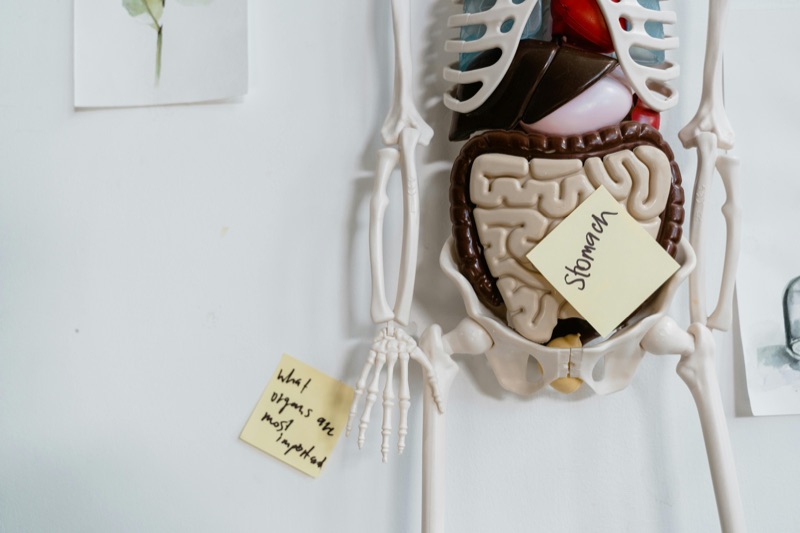
A healthy microbiome acts like a shield: it facilitates digestion, protects against infections, regulates immunity, and even influences mood. But when it becomes imbalanced, various disorders begin to manifest. Understanding these signals is crucial for maintaining optimal intestinal health.
Common Signs of Microbiome Imbalance
When your intestinal flora is disrupted, your body sends clear warning signals through various digestive symptoms:
Constipation
Constipation alters digestive permeability, promoting inflammation and increasing the risk of certain cancers. It's often the first sign that your microbiome needs attention.
Diarrhea
Frequent diarrhea is often linked to an overgrowth of pathogenic bacteria that have displaced beneficial microorganisms in your intestinal tract.
Gas and Bloating
These uncomfortable symptoms are signs of excessive fermentation or an impoverished microbiome that can no longer properly process the foods you consume.
Food Hypersensitivities
When your immune system no longer recognizes certain foods as safe, it often indicates a compromised intestinal barrier and dysbiotic microbiome.
Acid Reflux
Contrary to popular belief, acid reflux is not caused by excess acidity, but rather by bacterial fermentation in the stomach or small intestine that creates pressure and pushes acid upward.
Candidiasis
An excess of candida, an opportunistic yeast that colonizes the colon, indicates an imbalanced microbiome where harmful organisms have gained the upper hand.
Gastric Ulcers
Between 80 to 90% of gastric ulcers are linked to Helicobacter pylori. Interestingly, in normal quantities, this bacterium actually protects against asthma and inflammatory diseases.
Irritable Bowel Syndrome
This condition is often associated with bacterial overgrowth in the small intestine (SIBO), where bacteria migrate from the colon to areas where they shouldn't be present.
The Microbiome: An Organ in Its Own Right
Your intestinal flora contains more than 100 trillion microorganisms - that's more than the number of cells in your entire body! This complex ecosystem evolves according to your diet, lifestyle, medical treatments, and environmental factors.
The remarkable news is that your microbiome can be rebalanced. By directly acting on your intestinal flora, you can permanently eliminate these digestive disorders and restore optimal health.
How to Rebuild a Healthy Microbiome
Restoring intestinal health requires a comprehensive approach that addresses multiple factors simultaneously. In our upcoming publications, we will present the 7 fundamental pillars of microbiome health:
| Pillar | Focus Area | Key Benefits |
|---|---|---|
| Living Nutrition Rich in Fiber | Whole foods and prebiotic fibers | Feeds beneficial bacteria |
| Fermented Foods | Probiotics and live cultures | Introduces beneficial microorganisms |
| Eliminating Disruptors | Antibiotics, processed foods, toxins | Protects existing microbiome |
| Stress and Sleep Management | Mental health and circadian rhythms | Supports gut-brain axis |
| Regular Physical Activity | Exercise and movement | Enhances microbial diversity |
| Reducing Excessive Hygiene | Balanced exposure to microbes | Maintains immune system training |
| Therapeutic Fasting and Targeted Protocols | Intermittent fasting and specific treatments | Resets and optimizes microbiome |
Your Journey to Digestive Wellness
Every symptom your digestive system presents is valuable information about your internal ecosystem. Rather than simply suppressing these signals, we encourage you to view them as opportunities to understand and heal your microbiome.
At Family Clinic, we specialize in comprehensive approaches to digestive health that combine traditional medical knowledge with holistic healing methods. Our goal is to help you achieve lasting wellness by addressing the root causes of digestive imbalance.
Remember, rebuilding a healthy microbiome is a journey, not a destination. With patience, consistency, and the right guidance, you can restore your digestive health and experience the vitality that comes with a balanced intestinal ecosystem.
Warm regards, Dr. Said-Alaoui Moulay Abdellah and the Family Clinic Team
